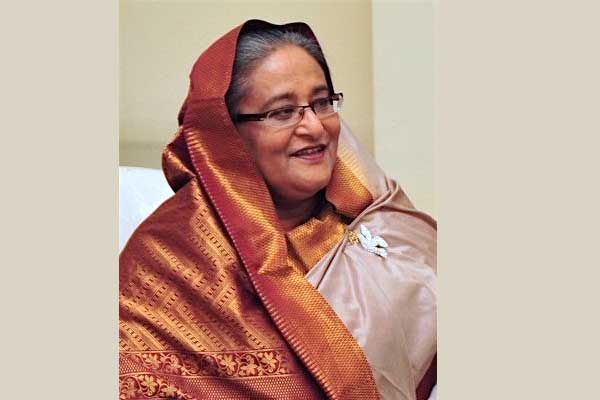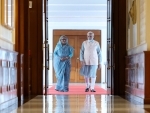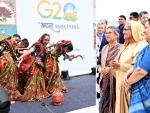Column

World Bank Report indicates encouraging socio-economic development in Bangladesh
Marking the occasion Prime Minister Sheikh Hasina addressed the nation highlighting the major achievements of her government and drawing the priority agenda for the next year in her endeavour to make Bangladesh a prosperous country. She expressed her government’s firm determination to make the country a middle income one by 2021 while a developed and prosperous one by 2041.
{special_block_1}Now, four years down the line the government not only stands on a firm footing, Sheikh Hasina is also being globally acclaimed for her able leadership. In the international arena she is being praised as ‘Mother of Humanity’ and ‘New Star of the East’ for setting up a unique example of humanity and peace by providing shelter to thousands of Rohingyas fleeing ethnic cleansing from their homeland, Myanmar.
In every aspect of socio-economic indicator, Bangladesh under Sheikh Hasina’s leadership has earned impressive achievements in infrastructure development, poverty alleviation, power generation, nutrition, maternal and child health, primary education and women empowerment.
The country’s agriculture sector witnessed major development in last few years with attaining self-reliance in meeting demand of staple food grains due to some effective policy measures and timely intervention by the government, so opined Bangladesh Agriculture Research Institute (BARI) Director General Abul Kalam Azad.
A piece of good news from a World Bank report went almost unnoticed. It stated that in 2000, six crore thirty lakh people lived below poverty lines in Bangladesh, but this figure came down to four crore thirty lakh in 2010. Despite increase in population during the period there has been 26% decline in the number of people living below poverty line.
The World Bank report revealed that infant mortality rate has declined and literacy rate increased in Bangladesh during this time. 98% of the country’s girls have joined primary schools which is an all time record. All this has been possible because of the present government’s untiring efforts to ensure gender parity and spread education in the country.
Prime Minister Sheikh Hasina has vowed to pull out the remaining ultra-poor people of the country from their hardship through various programmes within the remaining year of tenure. Her government’s main focus is to build a hunger and poverty free Bangladesh.
The government has expanded the coverage of its safety-net programme and increased allocations for it to provide financial support to 57.67 lakh people helping them come out of extreme poverty. On the other hand, it has successfully contained terrorism and militancy in an iron hand.
The list of big things Bangladesh achieved with Sheikh Hasina holding the reins for nine years at a stretch will be a long one. To name a few: Bangladesh has transformed from a least developed country to a lower middle income country and achieved highest GDP growth of 7.28% in the previous fiscal year, per capita income increased to US $ 1610, the electricity generation capacity rose to 15,379 megawatts from 4,942 megawatts in 2009, infrastructural development has been taking place at a breakneck speed, militancy has been checked with an iron hand and last but not the least, some top ranking war criminals have been brought to justice and others are in the process.{special_block_2}
The government has achieved tremendous success in infrastructure development. These include beginning construction of the much-cherished Padma Multipurpose Bridge Project which has already been finished 50% and is set to be opened to vehicular traffic by December 2018.
The government has completed the 190.48 km Dhaka-Chittagong Four-Lane Highway, the country’s third Seaport Payra at Kalapara of Patuakhali and several flyovers in Dhaka, Chittagong and Feni. The construction of first metro rail service is under way and is set to be opened for passengers from Uttara to Agargaon in 2019 while the rest (Uttara to Motijheel) will be opened in 2020.
The Sheikh Hasina-led government has set up 28 power plants with a total capacity of 4,086 megawatt between January 2014 to December 2017 through public and private entrepreneur initiative. The government has brought 26 Upazilas under 100% electricity coverage as part of ‘Electricity for All by 2018’ programme.
There has been manifold increase in employment generation and 10% increase in opportunities for self employment and self reliance. There has also been increase in employment opportunities. Families nowadays have more than one wage earner. Average income has increased by 9.5% during ten years from 2007 to 2017. The New Age, Wall Street Journal, The Economist and many other international magazines have hailed Bangladesh’s economic progress as among the best by any South Asian country.
The concept of ‘Digital Bangladesh’ was floated by Sheikh Hasina in the Awami League’s ‘Vision 2021’ manifesto. To make it a reality the government has come forward with innovative ideas and been jointly working with other stake holders.
‘Young Bangla’ has teamed up with Microsoft to provide technological support among rural people. They will offer basic computer training to 50,000 students in different academic institutions across the country. Young Bangla is also collaborating with the government’s ICT division to set up country-wide computer and language training labs. So far 2,800 labs have been established while 1000 more will be set up this year. The lives of 162 million people of the country are being transformed in to a digitalized knowledge-based society, thanks to Sheikh Hasina’s ‘Digital Bangladesh’ vision.
Bangladesh has entered the global nuclear club as Prime Minister Sheikh Hasina inaugurated the construction work of the Rooppur Nuclear Power Plant, the maiden nuclear plant of the country, on November 30, 2017.
Bangladesh is set to launch its first commercial satellite Bangabandhu-1 in March this year.
According to World Bank report published in April, 2017 both India and Pakistan have been outperformed by Bangladesh in terms of women’s employment. Bangladesh outshined many of its South Asian counterparts with 57.4 percent women participating in employment.
GDP growth rate reached 7.24 percent in 2016-17 fiscal year – an all-time high in the history of the country. Per capita income during this period increased to $ 1, 602 or Tk 127, 129.10, according to Bangladesh Bureau of Statistic’s estimate.
The government’s Seventh Five Year Plan aims to achieve 7.4 percent GDP growth rate annually for 2015-16 and 2019-20.It will not be out of place to mention that GDP growth rate in the recent past was adversely affected by violent politics, arson attacks and vandalism caused by blockade and hartal enforced by BNP and allies in 2015.
In short, it is evident that the popularity and acceptance of Prime Minister Sheikh Hasina continue to remain on upward spiral all along for her role in leading the country forward, ensuring socio-economic development amid political unrest, trying war criminals and curbing violence and militancy.



